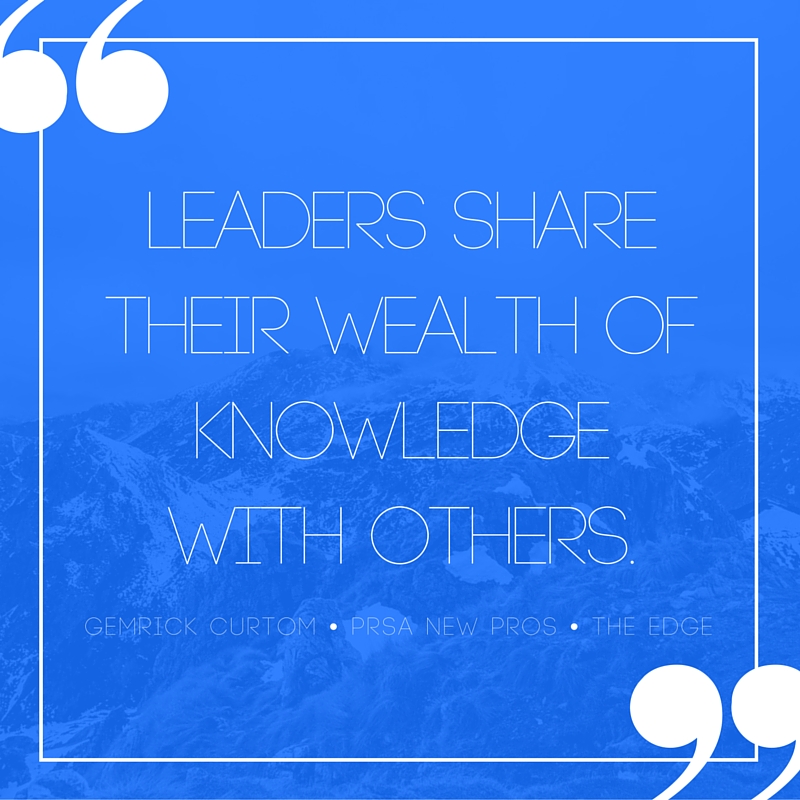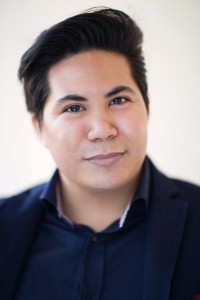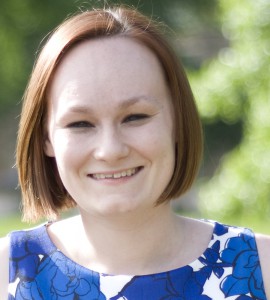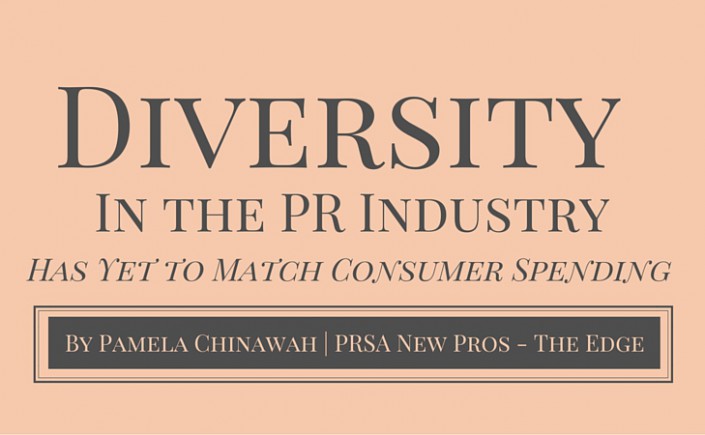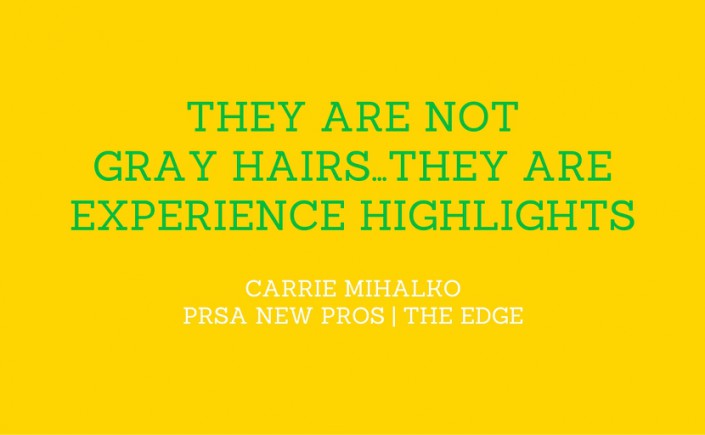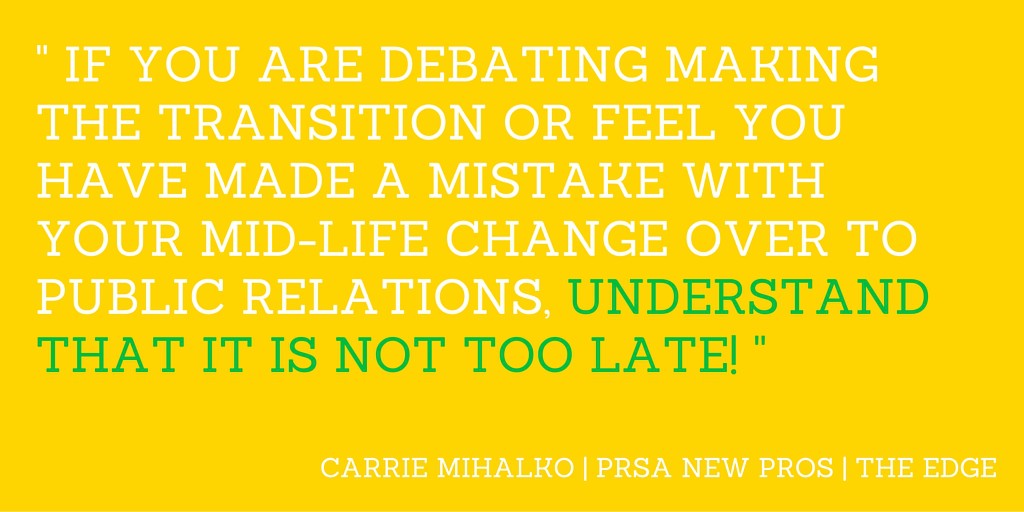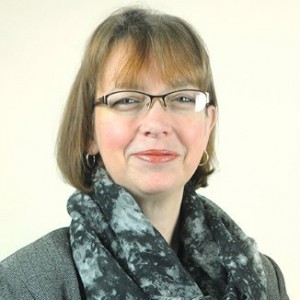Editor’s Note: As part of our month-long topic on continuing education we’ve touched on the APR, Tools for New Pros and other professional development. Today, we’re interviewing members of PRSA’s New Professionals section that have completed some form of higher education or are in midst of earning their graduate degree, with an end goal of advancing their public relations career.
Meet our panelists and their earned or in-progress graduate degree:
Lindsay Moeller
Master of Education in Higher Education (Student Affairs), Iowa State University
Simon Oh
Master of Science in Transportation Management (administered by the Mineta Transportation Institute), San Jose State University
Brian Price
Master’s in Public Administration, Northern Michigan University
Robyn Rudish-Laning
Master of Science in Media Arts & Technology (focus in Creative Media Practices), Duquesne University
Alyssa Stafford
M.A. Journalism and Mass Communication (concentration in Health Media and Communication), University of Georgia
What made you decide to go to graduate school?
LM: First, I love school. Second, I knew I would need to get a graduate degree in order to pursue a career in Student Affairs.
SO: To prepare myself for a greater role in transportation, potentially managing a team, department or an entire organization within the business.
BP: I decided to stay at NMU after graduating with a bachelor’s because I had a graduate assistantship opportunity. I worked as a G.A. in NMU’s communications office both years. I couldn’t turn down the discounted tuition, stipend and relevant work experience (and faculty lot parking pass!) so I’d advise anyone looking at grad school full time to research G.A. opportunities. I thought about an MBA but lacked prerequisites for multiple classes and ultimately decided to build on my communications background by applying it to public administration and policy.
RRL: It was a perfect storm of things. When I finished my undergraduate degree in 2011, jobs were hard to find and I had had some internships, but nothing that turned into a real full-time lead. I didn’t feel like I had a completely firm grasp on what I wanted to do, besides work in PR, (I understand now that no one actually has it all figured out.), but I didn’t want to move back home to figure it out either. I knew that I would have better opportunities to gain experience in Pittsburgh and I had already begun to develop connections out there from my undergraduate work. It just so happened that my alma mater, Duquesne, also offered 25 percent off of graduate degree tuition for particular programs, mine included, to alumni. So in August 2011, I packed everything up and moved back up to Pittsburgh to pick right back up where I left off in May.
AS: My bachelor’s degree is in creative writing, and I ended up in a job where I was doing sales and marketing. When I discovered public relations, I knew I wanted to make the switch, but I had no idea where to start. I decided to get my master’s in PR, thinking a formal education was what I needed to make the transition. It turned out that while my classes got me up to speed academically, the most important thing for me was being exposed to professional development opportunities as a graduate student.
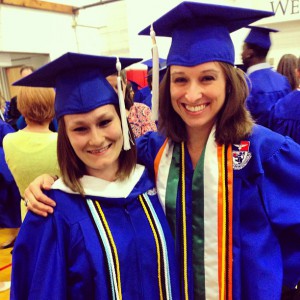
Robyn Rudish-Laning on graduation day.
How has your degree helped or simply played a role in your PR career?
LM: It helped me to get my first job out of graduate school working in college admissions, which put me on the path to working in the marketing department and eventually PR.
SO: Although the degree is not required, it will almost certainly help me elevate to a position like a PIO or community relations manager for transportation projects down the line.
BP: In the classroom I learned general concepts like how to apply research, how to truly research a topic and honed my ability to read and digest complex issues; it was a unique opportunity to really build up those muscles. Outside of class, I applied that knowledge to executing digital and traditional media for NMU as a G.A. and just spent a lot more time crafting my skills. I was really in that student mindset where you try to read and learn everything while in grad school, which is difficult to maintain in a full-time job.
RRL: I felt like my graduate program was much more hands-on than my undergraduate program, even though they were within the same department at the same school. It also wasn’t entirely PR-focused. Instead, I learned a lot about related skills, like marketing, social media, journalism, advertising, web design, etc., on top of furthering my PR knowledge. The program wasn’t rigid, so I was able to pick and choose classes from a number of disciplines to round out my skill set. I think these things have been most helpful in my career because I was able to really dive into what I was interested in and what I thought would benefit me most. No two people in my program graduated with the same exact experience or degree, no matter what our diplomas said.
AS: I actually switched my concentration from Public Relations to Health Media and Communication, because I wanted to develop expertise in healthcare communications, social marketing. My concentration also emphasized health journalism, which trained me in writing about health topics for a broad public audience. I joined the Association for Healthcare Journalists and attended their annual conferences and reported at the Society for Neuroscience conference. I learned how to shoot and produce videos, worked on my writing craft and came away with a great portfolio of published work.
I also dove into professional development opportunities through UGA’s PRSSA Chapter. I served as the chair of the events committee my first year, and became president my second year. I really put myself out there in ways I hadn’t during undergrad. A big part of this was finding my passion. I didn’t know what I wanted to do in college, so I was much more energized and ambitious during graduate school. I also felt a sense that this was my last chance to make the most out of being a student. I credit PRSSA with helping me land my job at Piedmont Healthcare in Atlanta. I was hired on as a contractor in 2014, an opportunity I had because I met the PR manager at a PRSA/PRSSA networking event.
What is some advice you would give to PR pros wondering if they should go back to school?
LM: Graduate school was such a great practice for me in really learning how to buckle down and apply myself. Even if I didn’t get a degree in public relations, I think that it really helped me to learn how to research, plan and effectively communicate with multiple audiences and the importance of being able to do all of those things. I think it maps really well to PR.
SO: Think about where you stand now and where you want to go in your career. A graduate degree could expand opportunities beyond where you currently stand. Do your research before embarking on any program.
BP: Hard for me to say as I went straight through at NMU for six years. But I would think it’s important to have a vision for how this plays into your larger career goals, because this isn’t a challenge you’re going to want just for fun.
RRL: Only go back if you’re willing to put in all the work necessary and if you’re doing it to better yourself. Don’t go back to delay getting out into the real world or assume it’s going to be easy. The two years I spent working on my master’s were the two hardest years of my life so far. The best advice I can give is to be sure you’re pursuing it because you want to continue to learn.
AS: Even if you get funding through a graduate assistantship, grad school is expensive and time consuming. Think deeply about your goals and spend time asking questions of faculty and staff at your prospective grad school. Make sure that you really need and want a graduate degree before you commit. I usually encourage people to work for a year or more between undergrad and grad school, because it gives you time to establish yourself in the workplace. If you’re like me, you’ll learn a lot about yourself during that time and it will lend a lot of perspective to the decision-making process. Also, you’ll have work experience on your resume that will distinguish you from other graduate students who are job hunting at the same time you are.
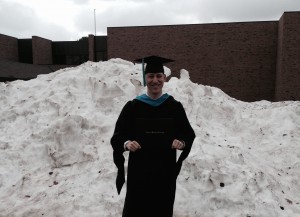
Brian Price with his diploma in snowy Northern Michigan.
What’s a fun fact or your favorite memory from grad school?
LM: This won’t seem like a fun memory to most, but at the end of my first semester of graduate school I had to write four papers which were due during finals week for a total of over 60 pages. It wasn’t fun at the time, but it was really fun for me once it was over.
SO: Working on a group project about transit-oriented development and, by my suggestion, injecting corgis into nearly every aspect of our presentation. Too bad we couldn’t get corgi ears headbands as part of the bit…or actual corgis.
BP: Teaching. During my final semester I was an adjunct instructor in my undergraduate academic department, teaching Introduction to Public Address to 23 freshmen and sophomores. It’s fun and I learned so much having the chance to teach a class while in grad school.
RRL: As a grad student, I worked for the Duquesne’s student newspaper, The Duke. In addition to helping me fine-tune my writing skills, all of the hours and late nights spent working on it gave me some of the best memories. My favorite was the “awards” ceremony we did after we finished the last issue of the year each year. We’d spend a week coming up with awards or superlatives for each of the editors and our advisor. I use the word “award” loosely because most of them were poking fun at the recipient or an inside joke we were all in on. Some of them were incredibly heartfelt, though, even if they were tinged with a bit of sass. We’d try to get the issue done as early as we could that night and take turns bestowing these awards on our colleagues, before heading to the nearest pizzeria/bar to celebrate. My favorite award? “Most likely to keep the newsroom waters calm as a proverbial tsunami approaches.”
AS: Traveling to the 2015 Association of Healthcare Journalists conference in San Francisco, meeting incredible reporters from around the country who are telling important health stories.
Considering going back to school or have an experience to share? Tweet us at #NPPRSA

